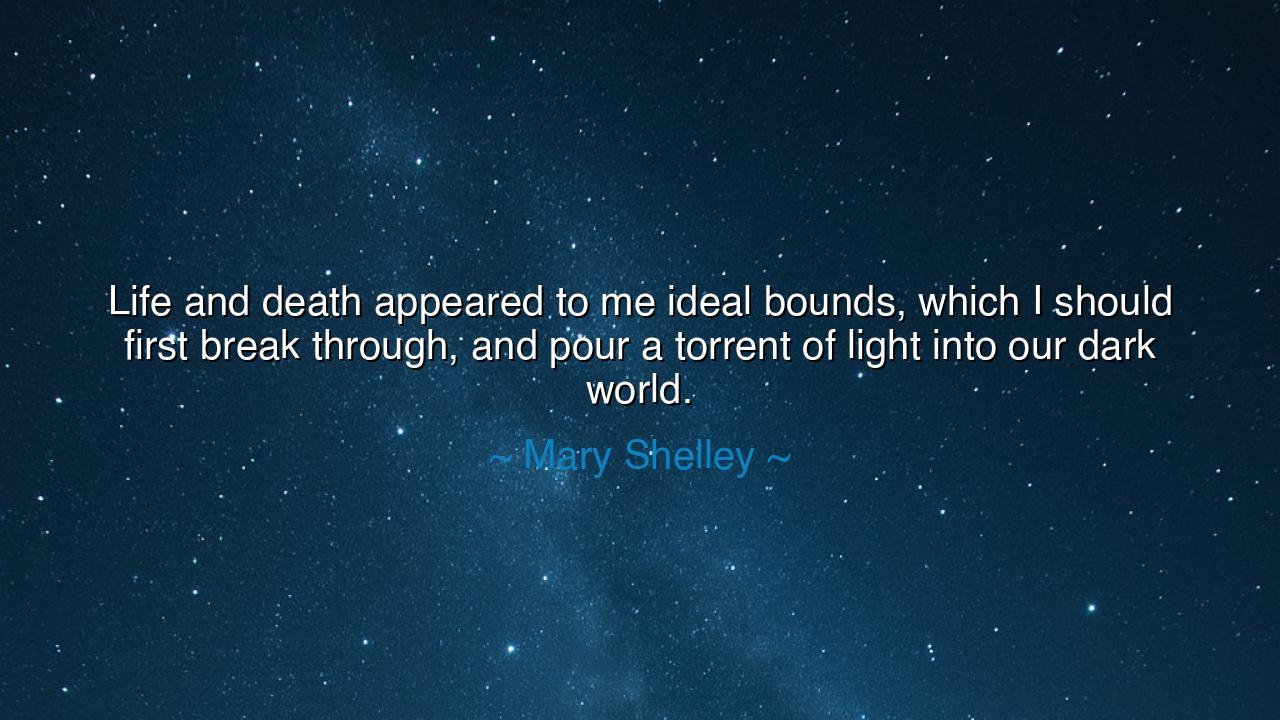
Life and death appeared to me ideal bounds, which I should first
Life and death appeared to me ideal bounds, which I should first break through, and pour a torrent of light into our dark world.






“Life and death appeared to me ideal bounds, which I should first break through, and pour a torrent of light into our dark world.” Thus wrote Mary Shelley, the brilliant and tormented creator of Frankenstein, in whose imagination the ancient dream of creation and the modern fear of consequence were joined. These words, spoken through the voice of Victor Frankenstein, reveal not only the longing of one man to master nature, but the eternal human desire to transcend limitation—to wrestle with the mysteries of life and death, and to bring light into the darkness of ignorance. Yet they also carry within them a warning: that to break such sacred bounds without wisdom is to invite shadow rather than illumination.
The origin of this quote lies in the fevered vision that birthed Frankenstein. In the year 1816, as storms raged over Lake Geneva, Mary Shelley—then only eighteen—found herself among poets and philosophers, her mind aflame with questions of creation and the human soul. The world was awakening to the new power of science; men like Galvani and Aldini sought to reanimate the dead with electricity, to breathe life where none remained. In this age of wonder and pride, Shelley conceived her tale—a tale not of triumph, but of tragedy. Her character, Victor Frankenstein, becomes a mirror of humanity’s deepest temptation: to overstep divine limits in pursuit of knowledge and glory.
When Frankenstein declares that “life and death appeared to me ideal bounds,” he speaks the language of every seeker and dreamer who has looked upon the universe and desired to uncover its secrets. These “ideal bounds” are the sacred thresholds set by nature—the boundary between what is given and what must remain mysterious. To break through them, he imagines, is to pour a torrent of light into the world—to conquer mortality, to end suffering, to achieve divine mastery. Yet in this ambition lies both greatness and peril, for light, untempered by humility, can burn as easily as it illuminates.
Throughout history, humanity has pursued this same struggle. The alchemists of old sought to transmute base metals into gold and mortals into immortals; their laboratories were filled with hope and despair. Centuries later, the scientists of the modern age split the atom and unlocked the fire of the stars—but in doing so, they also unleashed the specter of destruction. The tale of Prometheus, who stole fire from the gods to uplift mankind, lies at the heart of Shelley’s work. Frankenstein, too, is a modern Prometheus—a bringer of light who becomes a bearer of ruin. His tragedy is not that he sought knowledge, but that he sought it without reverence, forgetting that creation requires compassion as much as intellect.
Mary Shelley, though writing of science, was in truth writing of the human soul. The darkness she speaks of is not merely ignorance, but the moral blindness that arises when reason is divorced from love. Frankenstein’s torrent of light becomes a flood of sorrow because it lacks wisdom; his pursuit of creation becomes destruction because it lacks understanding of life’s sacred balance. Thus, Shelley teaches that the quest to transcend death is not evil in itself—it is the lack of humility and empathy that makes it monstrous. The light of genius must always be guided by the warmth of conscience, or it will turn to shadow.
In this way, Shelley’s words reach beyond literature and science to touch the eternal truths of existence. Every generation faces the same temptation: to wield power without restraint, to seek mastery without mindfulness. Whether it be in technology, politics, or personal ambition, the human heart must ask—do we break the bounds of life to serve life, or to exalt ourselves? For even now, as we reach for the stars, create artificial minds, and alter the fabric of nature, the lesson of Frankenstein endures: that to create without compassion is to destroy.
The lesson, then, is both luminous and grave. Strive for knowledge, but temper it with wisdom. Seek to expand the boundaries of life, but never forget the sanctity of the living. Let your pursuit of truth pour light, not fire, upon the world. If you must break through limits, do so not in pride, but in love—for the heart that guides the hand determines whether creation becomes salvation or ruin.
So, O seeker of understanding, heed the wisdom of Mary Shelley: the bounds of life and death are not prisons, but guardians of balance. To break them is a sacred act, not a conquest. Let your light be gentle, not blinding; your power be humble, not vain. For it is not through defiance, but through reverence, that one truly brings illumination to the dark world.






AAdministratorAdministrator
Welcome, honored guests. Please leave a comment, we will respond soon